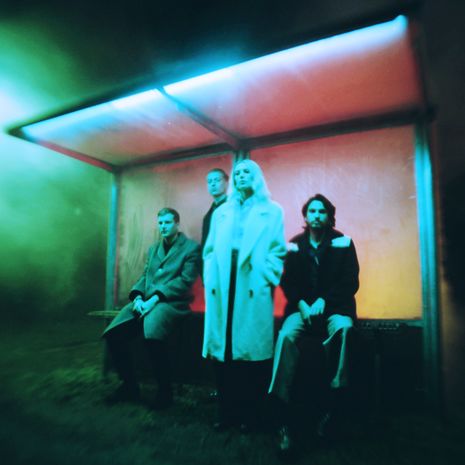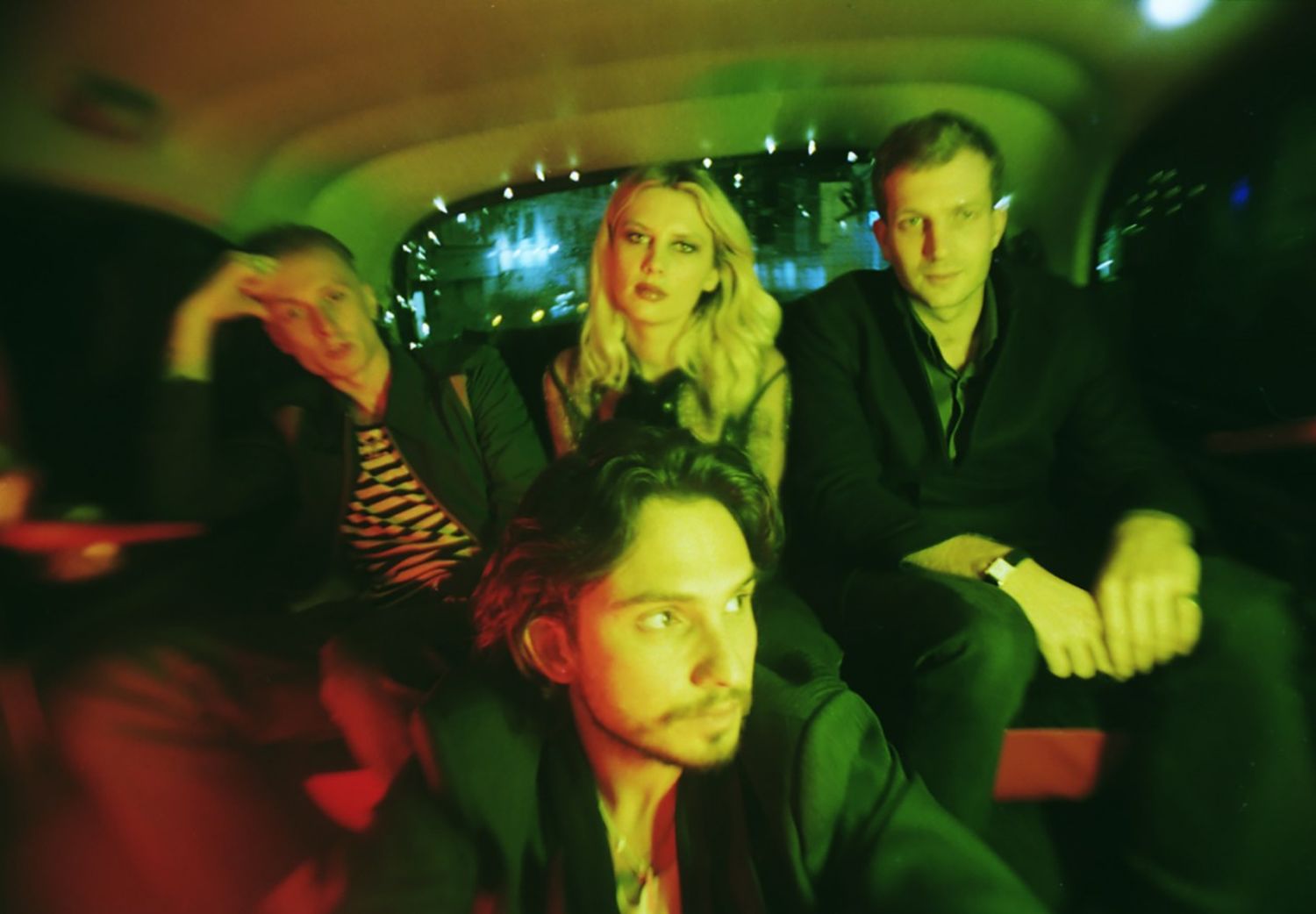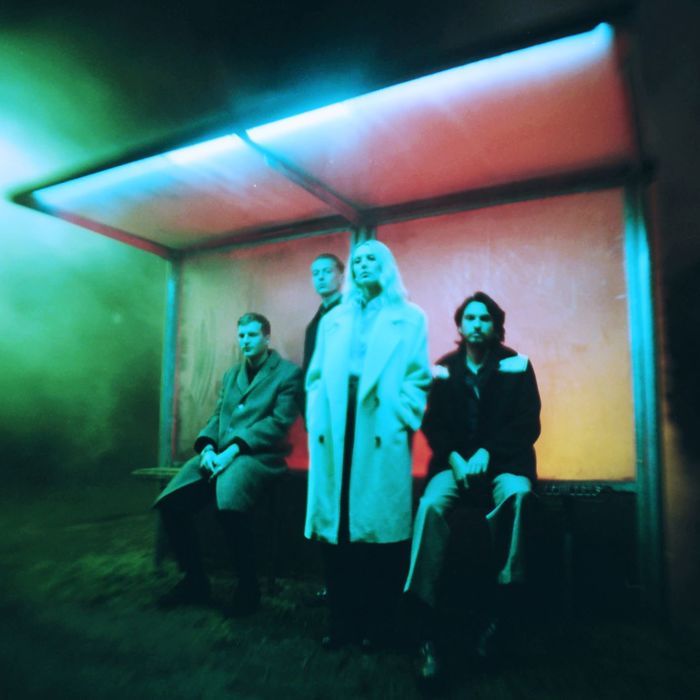It has now been over a decade since Wolf Alice began making music together. Initially, they were a duo, made up of vocalist, lyricist and guitarist Ellie Rowsell and guitarist Joff Oddie, which soon expanded to include bassist Theo Ellis and drummer Joel Amey. Following a run of EPs, the four-piece released their debut album, My Love Is Cool, in 2015, which reached number two in the UK album charts. Their second album, Visions of a Life (2017), won the 2018 Mercury Prize.
After this success, it must have been daunting to embark on the creation of their next album, with an awareness of the ‘third album syndrome’ which many bands have been said to suffer from. Listening to Blue Weekend (released on June 4th 2021), it is clear that the band have avoided this completely. The softly spoken verses, grungy guitar riffs, building choruses and insightful lyrics which are typical of a Wolf Alice song are still present, but the band has gone several steps further with this album. The sound of the album wraps around the lyrics, with its newly introduced orchestral elements and layering of voices and instruments. The album feels both vulnerable and powerful, telling of love, heartbreak, disillusionment, rage and liberation.
“Extravagance disguised as elegance is boring,” Ellie declares in ‘Delicious Things’, a song that tells the story of an unnerving experience in LA. ‘Lipstick On The Glass’ has an otherworldly, dangerous feel to it: “The full moon rising but it’s me who makes myself mad”. ‘Smile’ is an assertion of the power of sensitivity, and anger at being patronised and undermined: “I am what I am and I’m good at it, and you don’t like me well that isn’t fucking relevant”. ‘The Beach’ and ‘The Beach II’ (the first and final songs on the album) are completely distinct in mood, although both feel deeply nostalgic and tell of profound connections between people. Blue Weekend shows a marked transition from the band’s earlier songs, which were resolutely not about love – a change which Ellie has said came from a realisation of the role music can play in finding solace and a sense of connection and community. It’s still impossible to place Wolf Alice within one genre, but both the sound and lyrics of the album feel more cohesive than ever before.
I’ve been a fan of Wolf Alice since my mid-teens, chanting ‘Don’t Delete The Kisses’ at New Year’s Eve celebrations and listening to ‘You’re A Germ’ on repeat to psych myself up to do intimidating things. My Love Is Cool and Visions of a Life have accompanied me through my adolescence and into my twenties, and now Blue Weekend has been released at what feels like the perfect moment: shortly before lockdown restrictions lift, and just in time to become the soundtrack to summer. In mid-May, I got to interview Wolf Alice’s Theo Ellis and Joff Oddie about the creation of Blue Weekend and what they’ve been doing in the months leading up to its release.
“The album feels both vulnerable and powerful, telling of love, heartbreak, disillusionment, rage and liberation”
It starts with the usual mild Zoom chaos. They’ve recently got back from Live at Worthy Farm rehearsals in Glastonbury, the perfectly timed sirens and car horns in the background immediately signalling that they are indeed in London. Theo joins the call, and then immediately disappears to grab a Snapple. While he’s gone, Joff appears. Then the quintessential Zoom awkwardness of everyone saying, “Hi, how are you?” at the same time and thus all muting each other.
We break the ice by talking about the lead up to the album’s release, which is finally starting to feel real to them. “That was what I was most scared of,” says Theo, “when I realised we were going to be putting it out in the middle of everything being… a bit tricky… but it feels exciting, like we’re building up to something.” I tell them about my prep for the interview: the full Blue Weekend listening experience, which involved borrowing a blue light from my housemate and projecting it onto the ceiling, and then lying on the floor and listening to the album from start to finish. “That’s commitment!” Joff says, and Theo follows up with, “That’s a proper listen. I usually put it on when I’m cooking or something.”
Since the past year of seemingly endless lockdowns has inarguably put us in a place of romanticising the past, I ask Joff and Theo if they think the sound of the album emerged from nostalgia, or if it looks more towards the future. Joff replies that while of course “circumstance and context have a profound effect on whatever art you’re making”, the record was written before the pandemic, and recording was done half before and half during. “So we were well on our way, really. Any response triggered by the pandemic would be in regard to the music videos, which we curated after the fact. Thinking about it now, the music videos are very much reminiscent of the days before.”
“It feels exciting, like we’re building up to something”
Only three music videos have been released by the day of the interview. The music video for ‘The Last Man On Earth’ takes place on a beach, while ‘Smile’ is a distorted, trippy vision of a gig at a pub, and ‘No Hard Feelings’ consists of dreamy images of pylons, night buses and neon-lit bus stops. I ask if they see the worlds of each video as being connected and forming a greater narrative. “Yeah, budget Lemonade,” Joff jokes, revealing that there will be eleven music videos, one for each song, which follow the band on a night out. I tell them that the visual element of this album feels particularly coherent and continuous this time, as though it is its own world that is both dreamy and attached to reality, but in a kind of liminal space.
Joff seems pleased. “Thank you! We worked with a guy called Jordan Hemingway, who is incredible at blurring real and fantasy worlds. It was a real pleasure to work with him. We had a good time, didn’t we Theo?”

“He’s very talented. I was definitely a fan of him before – we’d watched some stuff he’d made. Initially, I thought he was too cool for us… and then it turned out he is too cool for us, but he also wanted to work with us.” Wry and self-effacing, the two of them are living up to my expectations.
They clearly had a lot of fun filming the videos, but are there any stand-out memorable moments from the process? “Oh yeah, the whole thing, man! It was fucking amazing,” Theo responds enthusiastically. “The director of photography, Molly [Manning Walker], she was incredible. The crew were so good. We were, like, burning a red carpet on a beach outside of Hastings with Ellie singing in front of it on a piano. All this stuff was like, sensory overload, because it had been so long since we’d gone and done anything. Simulating playing in bars and getting in the ocean – well, Ellie getting in the ocean and all of us watching her semi-drown. That was probably not a positive memory, but it was funny.”
I remark that watching the music video for ‘Smile’ was the closest I had been to being inside a pub until May 17th, to which Theo replies, “Oh, good! That’s some of the nostalgia we were talking about.”
“We were, like, burning a red carpet on a beach outside of Hastings with Ellie singing in front of it on a piano”
As many people have noted, the lyrics of Blue Weekend feel much more personal and autobiographical: ‘No Hard Feelings’ is a gentle acknowledgement of a bittersweet breakup, while Ellie steps out of her comfort zone in ‘Feeling Myself’ to write about sex and self-love. I ask Joff and Theo how the two of them reacted to the lyrics when Ellie shared them, to which Theo replies, “I don’t know if we really had a reaction. We’re such a safe space for sharing ideas…” Breaking off to scoff at himself, he continues, “Safe space… it sounds like I’m a community support officer.”
Digging deeper, I rephrase the question. When they read the lyrics, could they imagine what they would be as songs? Joff considers this. “It doesn’t really work that way,” he eventually says. “Ellie doesn’t send over, like, a Word document – that would be an interesting and odd way of doing it. Although some people do. The reaction to hearing some of the early stuff that she was doing was that I thought she was... killing it.” He nods proudly. “It imbued us with this sense of pressure in a way, because I felt like the songs were so brilliant that if we were unable to render the music around them in a way that supported them, properly, it would be a huge failure. I felt pressure to musically back what she was doing – it felt like if these songs were lost because the music wasn’t right, that would be a loss to the world.”
I reassure him that they definitely didn’t fail, and ask which song was the most enjoyable to compose – I imagine that ‘Play the Greatest Hits’, the album’s punk rock interlude, was a lot of fun. “‘Play the Greatest Hits’ was fun,” Theo instantly agrees. “‘Play the Greatest Hits’ is supposed to be fun. It’s the most instant and short and snappy, and doesn’t take itself too seriously. This album I think is a little bit more… mature… basically, some of the songs were really difficult. I enjoyed the process of just playing the bass for ‘How Can I Make It OK’ because it was a kind of syncopated rhythm that we haven’t really done before that – an 80s-ish poppy vibe. I’m trying to think what else was fun.” He briefly considers. “That’s enough. That’s enough fun for one album.”
“It felt like if these songs were lost because the music wasn’t right, that would be a loss to the world”
When asked if they think anything will change about the way the band performs live in the wake of the pandemic, Joff mentions that they’ve been playing with string sections and that they’ve got a new person who they are playing with at the moment: Ryan Malcolm, who used to be in the band Superfood. They’re working out how to play the new songs, as well as develop the old songs so that they don’t leave them behind or continue playing them the way they were five or six years ago: “I don’t know about putting a new spin on them. It’s a case of making them better, filling in the gaps – another person allows you to do that.”
When asked if there’s a venue they’re especially excited to return to, Theo gets particularly animated. “The January tour has got a load of good places. We’re playing Plymouth, which we’ve been threatening to do. Joel has moved to Hastings and we’re playing Bexhill-on-Sea, which is near where he now fishes or whatever the fuck he does. And Glasgow! We’re spending a bunch of time playing the Barrowlands – that’s one of the best crowds in the world. Playing any gig anywhere is going to be amazing... I’ll do anything to get out of the house now.”
A few months before the interview I listened to Annie Mac’s Future Sounds on BBC Radio 1, when Ellie and Theo made some excellent song recommendations (SAULT and HAIM, amongst others), so I wonder which other artists they were listening to while creating the album. “Ellie made a point that she could hear when she was listening to Christine and the Queens and that it correlates with some of the songs. We’re all fans, but Ells is a big fan of them,” Theo says. “We’ve mentioned Ultraviolence – one of the best Lana Del Rey records. ‘Safe from Heartbreak (if you never fall in love)’ took inspiration from The Roches, who Ellie’s brother showed us when we were in her garden having a barbecue. It’s very close-stacked harmonies and it’s quite a vintage-sounding production, but it’s actually from more recently than you think it is.” “Joel was listening to a lot of The Chemical Brothers and Soulwax,” Joff interjects. Theo nods, and muses, “It’s become easier for us to say what we were listening to on this album than any of the others.”
In a group of very individual personalities, what’s the dynamic within the band? In the absence of the other members of Wolf Alice, Joff and Theo are quick to pick and run with my hypothetical challenge: faced with a minor crisis, what role would each of them take?
“Give us a scenario, let’s focus in on this,” Joff says excitedly. “Burglary? Alright… a bandit enters the tour bus.”
“A hamburglar!” Theo exclaims.
“Come to steal our delicious hamburgers.”
“Joel would befriend him by accident and then give him all his bank details,” Theo decides. “Ellie would be in a blind state of panic. I would potentially get a beer with him... and then I think Joff would have to sort it all out tomorrow.”
Isn’t there a flaw in this fanciful logic, though? They’re not really deterring people from robbing the tour bus if the punishment is getting to be friends or have a beer with Wolf Alice. Theo responds, laughing, that if the burglar has got that far they probably deserve it.
And now the question that I’ve wanted to hear the answer to for ages: I know that the band name is taken from the title of an Angela Carter short story, but do they remember the exact moment when they figured out that they wanted to use it? It’s less profound than I expected, but a nice story nevertheless.
“We needed a name for the Myspace page,” Joff says. “Ellie’s mum took a book off the shelf which was that collection of stories by Angela Carter and went, “Wolf Alice, that would be a good band name!””
But isn’t it a name that can easily be misheard. “We’ve heard ’em all before,” says Joff, undaunted. “Sticks and stones.”
We briefly talk about the report on the initial findings of the outdoor gig tests – it’s no less safe than going shopping, apparently. Theo is incredulous that I’ve said I miss live music more than the pub... so I wonder where they’ll be on the day the album is released.
“Our management are slowly putting in really shit little things to do to try to ruin the day,” Theo laughs, “but I’m sure we’ll have a glass of champagne… I’m sure by about midnight I’ll be sideways somewhere.”
Whether you’re sideways or on your feet, I hope you’re all listening to Blue Weekend on June 4th.


